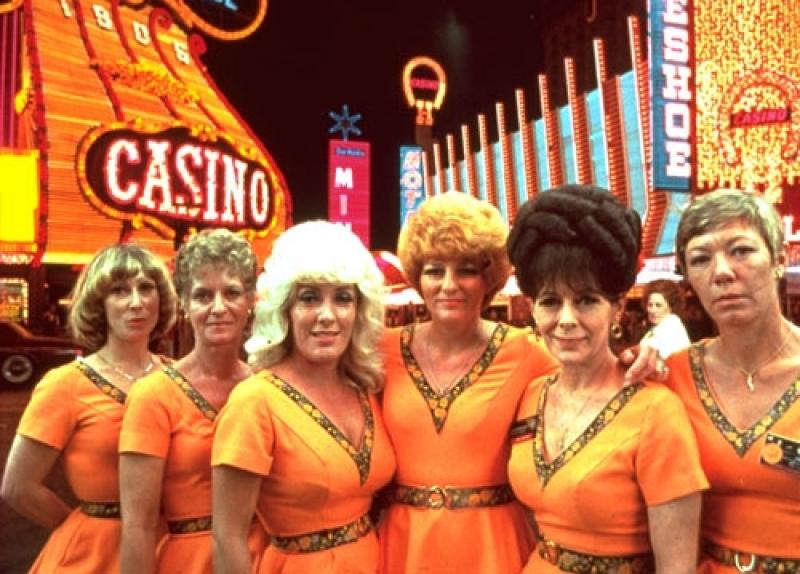Philip Glass Ensemble, Koyaanisqatsi, The Dome, Brighton | reviews, news & interviews
Philip Glass Ensemble, Koyaanisqatsi, The Dome, Brighton
Philip Glass Ensemble, Koyaanisqatsi, The Dome, Brighton
Philip Glass performs his classic film soundtrack live at the Brighton Festival

One of the hottest tickets at this year's Brighton festival is Godfrey Reggio's 1983 film Koyaanisqatsi accompanied by live soundtrack performance from the Philip Glass Ensemble. Sold out for weeks beforehand, there are touts outside but most of the middle-aged Bohemian audience seem to have bought their tickets well in advance. The reason it's such a draw is that Koyaanisqatsi is a cult whose enthusiasts are multifarious.
To the classical modernist it's a masterpiece of post-serialist synthesizer composition, meticulously synchronized to startling imagery. To the ecologically minded it's a potent extended metaphor for man's abuse of the planet - the word "Koyaanisqatsi", as the film's end titles tell us, means "life out of balance... a state of life that calls for another way of living". To the artistically inclined stoner, meanwhile, the film is a minimalist psychedelic classic, a perennial of the late night cinema circuit. Certainly for me the film is redolent of shared houses in the Eighties, living rooms misty with marijuana at 3.00 AM, lazy late night eyes fixed in awe on the dynamic audio-visual parade video-taped off Channel 4.
There was, then, a palpable sense of occasion as everyone took their seats in the packed venue. Glass tours Koyaanisqatsi occasionally but this is still a rare treat. He comes on with his Ensemble, a troupe of grey-clad middle-aged musicians who sit at an array of synthesizers, the winds lined up at the back. The conductor, Michael Riesman, arrives to further applause and seats himself at a central keyboard. The lights go down and there's a hush of anticipation so intense that a man in front of me, suddenly caught out with his noisy packet of crisps, receives a stern telling off from his neighbour.
It takes a little while for the Ensemble to hit their stride. There are a couple of fluffed organ lines and a sung sample of the title phrase is wrongly triggered very noticeably. Such bloopers mildly irritate at first but they also add a roughness, a sense of live occasion. In any case, the musicians soon bed down into score. As the cyclical rhythms start to really drive and the visuals gradually change from geological beauty (rolling forests, Utah desert) to man's interaction with the planet (artificial lakes, mining with explosives), it's impossible not to be swept up in the experience. The synthesized chorus, effectively led by the impressive live vocalising of New York composer Lisa Bielawa, adds to the impact.
When I recently interviewed Brian Eno, who's curating the Brighton Festival of which this performance is part, he said that he thought Koyaanisqatsi was "beautiful and impressive but also suspect propaganda for something that most of us already believe in - that things are a bit of a mess". He regards the speeded-up film of human behaviour, arguably used to portray humanity as an insectoid irritant on the vast canvas of nature, as a cheat, reliant on "post-production tricks". Eno has a point, as usual, but his ultimate criticism that we cannot learn anything from Koyaanisqatsi and that it's an unhelpful negative perspective on humanity disregards its sheer power as an intoxicating cosmic polemic.
The famous sequences of commuters and New York traffic speeded up and compared with productions lines and microchips still strike home despite years of lesser imitations. One of the brilliant things about Koyaanisqatsi is that, although the allegory at its core sometimes has sledgehammer subtlety, there are always enigmatic overtones, mystical hints and opportunities for interpretation The only thing about the film that seems noticeably dated, apart from obvious visual stuff such as cars, haircuts and clothes, is a recurring theme of nuclear power and explosions which is very Cold War in tone.
As Koyaanisqatsi draws to its end, Reggio and Glass don't leave us with a climactic hypno-rhythm explosion but drop to a quieter pace with a piece called "Prophecies". The final sequence, where a simple keyboard motif accompanies a chunk of burning detritus dropping from an exploding rocket and tumbling down and down through the sky, is beautiful and powerful, its meaning opaque yet surely relating to mankind reaping the consequences of vaunting ambition.
When the screen finally goes blank there is overwhelming applause, three curtain calls and a standing ovation replete with wolf whistles and howls of approval. Philip Glass cracks a smile, as well he might. Koyaanisqatsi remains totally riveting.
- Brighton Festival runs until 23 May
- Find Koyaanisqatsi on Amazon
Explore topics
Share this article
Add comment
The future of Arts Journalism
You can stop theartsdesk.com closing!
We urgently need financing to survive. Our fundraising drive has thus far raised £49,000 but we need to reach £100,000 or we will be forced to close. Please contribute here: https://gofund.me/c3f6033d
And if you can forward this information to anyone who might assist, we’d be grateful.

Subscribe to theartsdesk.com
Thank you for continuing to read our work on theartsdesk.com. For unlimited access to every article in its entirety, including our archive of more than 15,000 pieces, we're asking for £5 per month or £40 per year. We feel it's a very good deal, and hope you do too.
To take a subscription now simply click here.
And if you're looking for that extra gift for a friend or family member, why not treat them to a theartsdesk.com gift subscription?

Comments
...
...